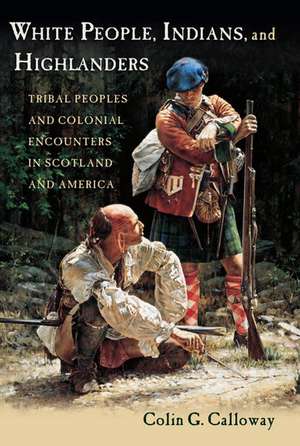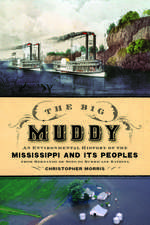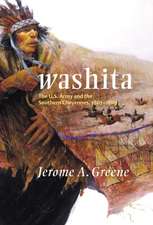White People, Indians, and Highlanders: Tribal People and Colonial Encounters in Scotland and America
Autor Colin Callowayen Limba Engleză Paperback – 15 apr 2010
Preț: 242.98 lei
Nou
Puncte Express: 364
Preț estimativ în valută:
46.49€ • 48.67$ • 38.47£
46.49€ • 48.67$ • 38.47£
Carte tipărită la comandă
Livrare economică 25-31 martie
Preluare comenzi: 021 569.72.76
Specificații
ISBN-13: 9780199737826
ISBN-10: 0199737827
Pagini: 392
Dimensiuni: 229 x 152 x 22 mm
Greutate: 0.57 kg
Editura: Oxford University Press
Colecția OUP USA
Locul publicării:New York, United States
ISBN-10: 0199737827
Pagini: 392
Dimensiuni: 229 x 152 x 22 mm
Greutate: 0.57 kg
Editura: Oxford University Press
Colecția OUP USA
Locul publicării:New York, United States
Recenzii
Brilliant and sometimes personal meditations on empire, heritage, and identity.
Calloway's book makes for thought-provoking reading for all students and scholars interested in the cultural impact of imperial expansion.
Satisfying as a rigorous treatment of a historical question hitherto approached only in piecemeal manner, Calloway's book also elucidates how the descendants of those displaced by early modern empires have continued to find new ways of understanding their ancestors' experience.
Calloway's study offers a compelling historical portrait of two groups struggling to maintain their homeland and cultural identities amid the turmoil and confusion unleashed by Euroamerican imperialism.
White People, Indians, and Highlanders deserves a readership interested in colonialism and ethnic identities on both sides of the Atlantic. With brilliant insights from the literatures and experiences of both Scottish and Native American studies, Calloway demonstrates the value of placing Native American and Scottish history in a much wider context than they normally appear.
Equally at home in the Highlands and in Indian Country, in the imperial capitals of London and Washington, D.C., Colin Calloway brings to light a fascinating, colorful world that sets side by side Gaelic and Iroquois, breech cloths and kilts, 'Removals' and 'Clearances,' even today's Highland festivals and Indian powwows.
A fascinating study that successfully compares in an insightful and original way the experience of both Highland Scots and American Indians; accessible and perceptive, it makes a significant contribution to Atlantic and imperial history, as well to the remarkable story of these two peoples.
Calloway reminds us how much the past remains within the present; hence the identities claimed by Scots, Indians, and Indian Scots today have been forged by their colonial experiences, their uprooting, and their many encounters with each other from the seventeenth century forward.
[a] fine and comprehensive study
Calloway's book makes for thought-provoking reading for all students and scholars interested in the cultural impact of imperial expansion.
Satisfying as a rigorous treatment of a historical question hitherto approached only in piecemeal manner, Calloway's book also elucidates how the descendants of those displaced by early modern empires have continued to find new ways of understanding their ancestors' experience.
Calloway's study offers a compelling historical portrait of two groups struggling to maintain their homeland and cultural identities amid the turmoil and confusion unleashed by Euroamerican imperialism.
White People, Indians, and Highlanders deserves a readership interested in colonialism and ethnic identities on both sides of the Atlantic. With brilliant insights from the literatures and experiences of both Scottish and Native American studies, Calloway demonstrates the value of placing Native American and Scottish history in a much wider context than they normally appear.
Equally at home in the Highlands and in Indian Country, in the imperial capitals of London and Washington, D.C., Colin Calloway brings to light a fascinating, colorful world that sets side by side Gaelic and Iroquois, breech cloths and kilts, 'Removals' and 'Clearances,' even today's Highland festivals and Indian powwows.
A fascinating study that successfully compares in an insightful and original way the experience of both Highland Scots and American Indians; accessible and perceptive, it makes a significant contribution to Atlantic and imperial history, as well to the remarkable story of these two peoples.
Calloway reminds us how much the past remains within the present; hence the identities claimed by Scots, Indians, and Indian Scots today have been forged by their colonial experiences, their uprooting, and their many encounters with each other from the seventeenth century forward.
[a] fine and comprehensive study
Notă biografică
John Kimball Jr. 1943 Professor of History and Professor of Native American Studies, Dartmouth College. Author of The Scratch of a Pen: 1763 and the Transformation of North America (OUP, 2006); One Vast Winter Count: The Native American West Before Lewis and Clark (University of Nebraska Press, 2003; winner of six 'best book' awards); First Peoples: A Documentary Survey of American Indian History (Bedford/St. Martins, 1999, 2004); New Worlds for All: Indians, Europeans, and the Remaking of Early America (Johns Hopkins University Press, 1997); The American Revolution in Indian Country (Cambridge University Press, 1995); The Western Abenakis in Vermont (University of Oklahoma Press, 1990); The Abenaki (Chelsea House, 1989); and Crown and Calumet: British-Indian Relations, 1783-1815 (University of Oklahoma Press, 1997).












